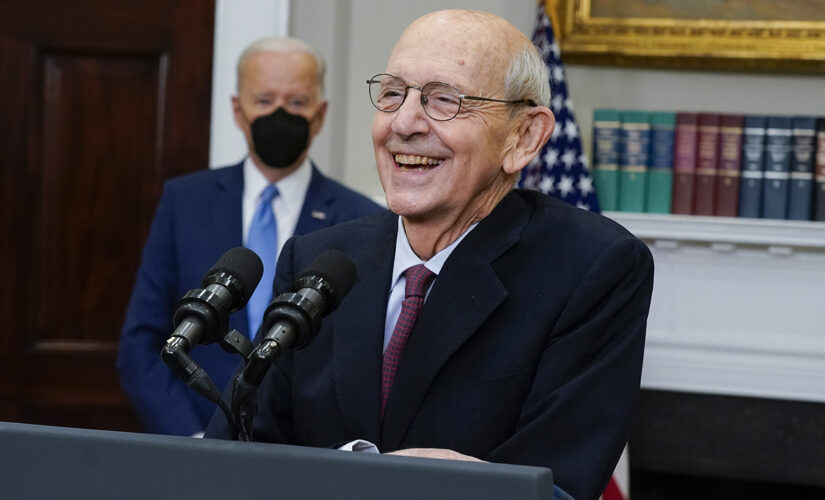NEWYou can now listen to Fox News articles!
Supreme Court Justice Stephen Breyer officially notified President Biden of his intent to resign at the end of the court’s current term.
In a letter dated Jan. 27, Breyer specifically expressed his desire to have his successor lined up before he steps down.
“I am writing to tell you that I have decided to retire from regular active judicial service as an Associate Justice of the Supreme Court, and to serve under the provisions of 28 U.S.C. 371(b),” Breyer wrote, referring to the statute dealing with retired justices and their ability to continue collecting a salary. “I intend this decision to take effect when the Court rises for the summer recess this year (typically late June or early July) assuming that by then my successor has been nominated and confirmed.
Supreme Court Associate Justice Stephen Breyer announces his retirement in the Roosevelt Room of the White House in Washington, Thursday, Jan. 27, 2022. President Biden looks on. (AP Photo/Andrew Harnik)
Biden spoke Thursday afternoon, thanking Breyer and praising him as an “exemplary justice,” before addressing the matter of his replacement.
WHO COULD REPLACE SUPREME COURT JUSTICE STEPHEN BREYER?
“Choosing someone to sit on the Supreme Court, I believe, is one of the most serious constitutional responsibilities a president has,” Biden said, stating that his “process is going to be rigorous.”
The president then made clear that while has reviewed some possible candidates, he reiterated his pledge to choose a Black woman.
“I’ve made no decision except one: The person I nominate will be someone with extraordinary qualifications, character, experience, and integrity, and that person will be the first Black woman ever nominated to the United States Supreme Court,” Biden said. “It’s long overdue, in my opinion.”
President Biden delivers remarks on the retirement of Supreme Court Associate Justice Stephen Breyer, left, in the Roosevelt Room of the White House in Washington, Thursday, Jan. 27, 2022. (AP Photo/Andrew Harnik)
Biden went on to say that he will choose a new justice, “not only with the Senate’s consent but with its advice,” stating that he would hear ideas from senators from both parties, as well as attorneys, scholars and Vice President Kamala Harris, whom Biden praised as “an exceptional lawyer.”
The president then announced that he plan to announce his nomination “before the end of February.”
Following Biden’s remarks, Breyer spoke briefly, thanking the president for his kind words. He then spoke about what he tells students when they ask what he loves about his job.
“It’s a kind of miracle, when you sit there and see all those people in front of you, people that are so different in what they think, and yet they’ve decided to help solve their major differences under law. And when the students get too cynical, I say go look at what happens in countries that don’t do that.”
Supreme Court Justice Stephen Breyer during an interview in his office, in Washington, in August 2021. (Bill O’Leary/The Washington Post via Getty Images)
“Of course, people don’t agree,” Breyer continued. “But we have a country that is based on human rights, democracy, and so forth.”
He then stated his agreement with Presidents George Washington and Abraham Lincoln, who called the country “an experiment.” He then paraphrased Lincoln’s Gettysburg Address, in which the sixteenth president said, “We are now engaged in a great civil war to determine whether that nation or any nation so conceived and so dedicated can long endure.”
CLICK HERE TO GET THE FOX NEWS APP
Breyer said that “liberals in Europe” scoffed at the idea of the American experiment when it began.
“You know who will see whether that experiment works?” Breyer asked. “It’s you, my friend.” He said it is up to everyone in present and future generations “to determine whether the experiment still works.”
“And I’m pretty sure it will,” he concluded.




